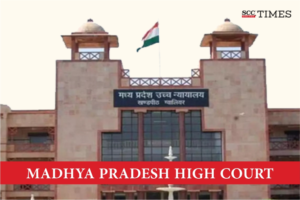Madhya Pradesh High Court: In a writ petition filed by the petitioner, who was previously serving as an Additional District Judge, challenging the High Court’s order dated 02-09-2014 to remove him from service following a departmental inquiry, and the State of Madhya Pradesh’s rejection of his appeal on 17-03-2016, a division bench comprising of Sanjeev Sachdeva, ACJ. and Vinay Saraf,* JJ., held that the removal order was based on valid grounds, findings of the inquiry are not deemed perverse or unjustified and the process followed was in compliance with the principles of natural justice.
Factual Matrix
In the instant matter, the petitioner was appointed as a Civil Judge, Class II, on 31-10-1987, and later promoted to Chief Judicial Magistrate and then to Additional District & Sessions Judge, Khargon in May 2011. On 12-08-2011, a complaint was filed by the complainant alleging corruption by the petitioner in handling bail applications under the M.P. Excise Act. A show cause notice was issued on 13-05-2013 under Rule 14 of the M.P. Civil Services (Classification, Control & Appeal) Rules, 1966, initiating disciplinary proceedings against the petitioner. An inquiry was conducted, and the petitioner was given opportunities to defend himself.
The inquiry report, dated 31-12-2013, found one charge against the petitioner proven and the other exonerated. On 14-03-2014, a show cause notice was issued based on the inquiry report. The petitioner’s response was reviewed, and on 24-06-2014, the Administrative Committee recommended petitioner’s removal from service. This Court ratified this recommendation vide order dated 19-07-2014, leading to the order of petitioner’s removal on 02-09-2014. The petitioner’s appeal was later rejected by the Governor on 17-03-2016.
Aggrieved by the impugned order of petitioner’s removal from service following a departmental inquiry as ratified by High Court, and the State of Madhya Pradesh’s rejection of his appeal, the petitioner preferred the present writ petition challenging the same.
Petitioner’s Contentions
The petitioner argued that the complaint by the complainant was not substantiated as the complainant was not examined during the inquiry and that the report was based on assumptions. The petitioner contended that discrepancies in bail orders do not equate to corruption but may reflect errors in judicial decisions, which do not constitute misconduct. It is argued that the inquiry did not properly consider the provisions of the M.P. Excise Act, and that the petitioner’s actions were within judicial discretion, not corrupt. The petitioner relies on precedents to argue that errors in judicial decisions are not misconduct unless they involve corrupt motives. The petitioner asserted that the penalty of removal was disproportionate to the findings and that there was no substantive evidence of corruption.
Respondents’ Contentions
The respondents argued that the inquiry was fair, and the findings were based on the petitioner’s inconsistent handling of bail applications. It was contended that procedural fairness was maintained, and that the petitioner was given ample opportunity to present his case. The respondents highlighted that judicial review should focus on the legality of the decision-making process rather than re-evaluating evidence. The respondents relied on precedents and emphasised that disciplinary actions against judicial officers are subject to higher standards of conduct and that the decision to remove the petitioner was valid under the circumstances.
Court’s Analysis
The Court reviewed the inquiry report and confirmed that the petitioner’s actions demonstrated a double standard in handling bail applications. The Court stated that “even though there may not be direct evidence to show corrupt or improper motive but on bare perusal of the bail orders, it can be seen that the judicial officer has acted in a manner which cannot be approved to any manner whatsoever. The inference of improper motive and extraneous consideration was properly drawn against the Petitioner.” The Court found that the procedure followed during the inquiry was appropriate and complied with the principles of natural justice.
The Court noted that “while exercising the powers of judicial review, the High Court should not normally substitute its own conclusion on penalty and impose some other penalty in the absence of any shockingly disproportionate quantum of punishment.” The Court reaffirmed that its role in judicial review is limited to examining the decision-making process and not to re-evaluate the evidence or impose a different penalty. The Court stated that judicial review does not extend to reappraising evidence and upheld the validity of the disciplinary action as the process followed was lawful and fair.
The Court referred to State Bank of Bikaner and Jaipur v. Nemi Chand Nalwaya, (2011) 4 SCC 584 and All India Judges Association v. Union of India, (1993) 4 SCC 288, and opined that when “a reasonable finding arrived at by the Inquiring Authority in the present case based on material available on record can neither be interfered with by this Court nor can it termed as perverse or unreasonable to such an extent that interference can be made by this Court.”
The Court did not deem the findings of the inquiry as perverse or arbitrary, and held that the petitioner’s removal from service is justified given the petitioner’s disregard for judicial norms. The Court held that the disciplinary proceedings and the resultant removal from service were conducted appropriately, and no interference is warranted under Article 226 of the Constitution of India.
Court’s Decision
The Court dismissed the present writ petition and upheld the order of removal dated 02-0902014 and the rejection of the appeal dated 17-03-2016.
[Nirbhay Singh Suliya v. State of M.P., 2024 SCC OnLine MP 5126, Decided on 25-07-2024]
*Judgment by Justice Vinay Saraf
Advocates who appeared in this case :
Shri Dhruv Verma, Counsel for the Petitioner
Shri Bramhadatt Singh, Deputy Advocate General, Counsel for the Respondent/State
Shri B.N. Mishra, Counsel for the Respondent No. 2

